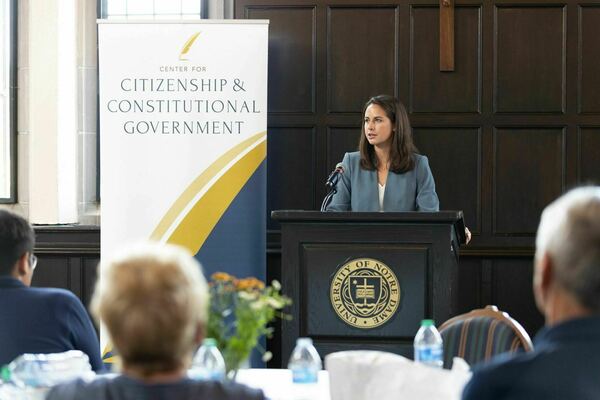
On September 15th, Kate Hardiman Rhodes ‘17, former Tocqueville Fellow, delivered a lecture introducing her 2021 book, Unshackled: Freeing America's K-12 Education System.
Hardiman Rhodes graduated from Notre Dame in 2017 with a B.A. summa cum laude in the Program of Liberal Studies and a minor in Philosophy, Politics, and Economics. She then received her M.Ed. through Notre Dame’s Alliance for Catholic Education (ACE) program in 2019 and graduated from Georgetown Law School in 2022. Unshackled was published alongside long-time champion of educational choice, Clint Bolick, a justice on the Arizona Supreme Court.
Friday’s talk introduced listeners to three types of school choice programs currently being implemented in the U.S.: voucher programs, tax credit scholarships, and education savings accounts (ESAs).
Beginning with a comparison of the 1923 classroom to the 2023 classroom, Hardiman Rhodes examined the leaps humanity has made in technological innovation, yet “many aspects of American public education have remained largely the same, [and] … the traditional public school is working less well over time.”
Sharing the shocking statistics of several major public school district proficiency levels, she said, “Throwing more money at the problem has had little to no impact; … there is a massive gap in what the system is accomplishing and our perception of how well it is working.”
“If another public system had these results, would we continue to let it operate? More than that, would we continue to give it more money?” she asks.
Showing how the 2019 pandemic further left children in public schools drastically behind proficiency levels, she found some amount of blessing in lock-downs and school closures: “Parents started to demand different solutions in education.”
Hardiman Rhodes says the philosophy of the book is this: “parents are the primary educators of their children, not the state. This means they should be financially and informationally empowered to choose the school or method of learning that works best for their child.”
Through policy implementations such as voucher programs, tax credit scholarships, and ESAs, “the money follows the child,” empowering parents to choose the education that is right for their child.
“ESAs hold great promise;” she says. “They enable parents to have the most choice and control over their child’s schooling, and as noted, they facilitate the expansion of homeschools and micro-schools, which have traditionally been underserved by vouchers and tax-credit programs.”
John Luke Hoonhout, first-year Ph.D. student in political theory, appreciated how the “presentation highlighted from the perspective of political theory how factions (such as the teachers’ unions) can hinder the pursuit of the common good. [Hardiman Rhodes and Bolick] were able to show once again that aligning policy with the truth about human beings - in this case, the parents’ rights as primary educators - tends to produce the best results.”
Push-back from both sides of the political spectrum has made it difficult for these programs to gain traction. In light of this, and the battles still to be fought for school choice, Hardiman Rhodes encouraged the audience to think about this problem differently: “To care about American education is to care about America, it’s to care about the future of our children. … It’s about caring about the possibility of true upward mobility, national security, the rule of law, the functioning of government, global competitiveness, educating for jobs that don’t yet exist, and so much more.”
“Will we train and equip the necessary leaders to run our country? Will we ever be able to seriously say to our children that this is a country of equal opportunity if the wealthy can choose private schools, some win the lottery, and others are trapped in their zip code?” she asks. “We need to create an education system as diverse as the children it serves.”
Professor Nicole Garnett, the John P. Murphy Foundation Professor of Law at Notre Dame Law School, who has written extensively on school choice, offered commentary following Hardiman Rhodes’ lecture. Tearing up, she offered the statistics showing success of school choice programs which will allow 10 million parents to choose the best form of education for their children next year. “As Catholics, this is particularly incredible,” she said, “because we know parents are the first and best educators of their children.”
Hardiman Rhodes concluded, “Of course, no policy is a panacea. No school is a substitute for a strong family, and we must be cautious of thinking of school choice in that way. But we know that schools of choice are creating better opportunities for children, and we know that they are empowering parents in a way that the traditional school system has failed to do for decades. That alone makes school choice worth striving for.”
Article contributed by CCCG Writing Fellow Merlot Fogarty.